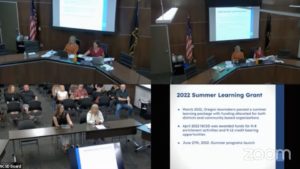Kansas transparency bill would require teaching materials to be posted online
Kansas lawmakers rocked the state’s education establishment this past week with a bill that requires all teaching materials to be posted online.
SB 393, the Curriculum Transparency Bill, saw its…

Kansas lawmakers rocked the state’s education establishment this past week with a bill that requires all teaching materials to be posted online.
SB 393, the Curriculum Transparency Bill, saw its first hearing Thursday in the Senate Education Committee. Like bills being passed and considered in other states, the Kansas bill would mandate that school districts post all curriculum, lesson plans and supplemental teaching materials by July 1 every year.
“Parents deserve access to the materials their children are exposed to during the school day,” says Sen. J.R. Claeys (R-Salina), one of the co-sponsors of the bill. “This law has minimal impact by only requiring that last year’s materials be posted online and any new materials during the current school year be posted prior to the last day of school.
“It is not an unreasonable request that parents have access to teaching materials quickly and easily. No one is being asked to plan an entire school year in advance.”
“This bill,” adds co-sponsor Sen. Caryn Tyson (R-Parker), “is a result of parents realizing there is no access to a list of curricula. It provides communication from the school to the parents.”
Yet, some teachers on social media are calling on the public to urge legislators to abandon the bill, claiming it is an overreach of government power. One of the bill’s opponents on Facebook called for others to “ambush your legislators with calls or messages” opposing it.
Supporters of SB 393 refer to it as “the bill that no one should be against,” suggesting that anyone’s opposing transparency in a classroom should alarm any parent.
Despite the fierce opposition from the educational establishment, Republican lawmakers in other states such as Iowa, California, North Carolina, Ohio, Indiana and Georgia are in various stages of drafting similar bills.
Richard Fancher, a former vice president of the Blue Valley School District in Johnson County, told The Lion, “I believe Senate Bill 393 attempts to capture and re-establish the essence of parental rights, input, control, clarity and transparency on all material taught within any local school district – to the obvious protection of its patrons: the taxpayers and parents.”
That sentiment is echoed in a growing movement across the nation. In the last election cycle, school board races were prioritized by angry voters in Kansas and elsewhere, as communities mobilized to replace school board members deemed unreflective of local values. Fancher argues this is no small matter, noting there are nearly 2,000 elected school board members in Kansas alone.
“The school board is quasi-judicial, in that they are one of the most politically powerful public entities in their (community),” he says. “They are the judge and jury, the maker of policy that sets the direction for their schools.”
The COVID-19 pandemic changed the way children were being taught. Largely for the first time, parents were in virtual classrooms with their children and were exposed to lesson plans and curricula. They and other parents and patrons are now demanding more transparency about what children are being taught in public schools.
“They are not interested in closing the doors of transparency that they became accustomed to through COVID,” says state Sen. Mike Thompson (R-Shawnee).



